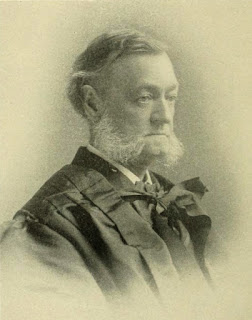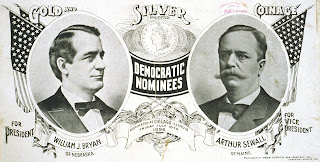 |
| Journeys Through Bookland |
Isaac Beckley Werner loved his books. One of the most popular blog post series that I have done is the request for readers of the blog to share their favorite childhood books. Recently I finished a book by British writer, Neil Gaiman titled "The View from the Cheap Seats." This week's blog post has grown out of a lecture Gaiman gave to a British organization created to encourage literacy in children. The lecture is titled, "Why Our Future Depends on Libraries, Reading and Daydreaming," and I hope the many of you who shared your favorite books and who have told me that the blogs about books and libraries are among your favorites will particularly enjoy this post and will share it with teachers, librarians, and readers who might also enjoy the wisdom of Neil Gaiman.
I have often regretted that I was not guided to some of the children's classics when I was growing up, nor encouraged to explore the stories inside the covers of "Journeys Through Bookland" on the family bookcase. However, Gaiman would not have agreed with me about the need for guidance. "They [children] can find the stories they need to, and they bring themselves to stories," he believes. "Well-meaning adults can easily destroy a child's love of reading: stop them reading what they enjoy, or give them worthy-but-dull books that you like, ...You'll wind up with a generation convinced that reading is uncool and, worse, unpleasant."
 |
| Gentleman Don |
One of the books that I found for myself belonged to my older brother, a gift to him from our Great Aunt Anna Marie that was already seriously old-fashioned when he received it. Yet, I loved it so much that long after I was grown I inquired to see if my brother still had the copy I had read. Apparently he no longer knew its whereabouts, so I found a copy online and bought it. When I reread it as an adult, it had lost its magic, but I still love the memory of reading that special book. Gaiman would understand my feelings, for he writes: "A hackneyed, worn-out idea isn't hackneyed and worn out to someone encountering it for the first time. You don't discourage children from reading because you feel they are reading the wrong thing. Fiction you do not like is the gateway drug to other books you may prefer them to read." Certainly I would not hand Gentleman Don to a young girl today, expecting her to fall in love with it as I did, but perhaps it was a "gateway" for me to tackle other 'grown-up' books with thick pages about other times in history.
There is a huge difference between imposing what a child should read and guiding children to things they might otherwise miss, and Gaiman emphasizes the importance of librarians in today's world of overwhelming information. "For all of human history, we have lived in a time of information scarcity, and having the needed information was always important, and always worth something. ...Information was a valuable thing..." Today, however, "we've moved from an information-scarce economy to one driven by an information glut." The role of librarians has become increasingly important, as is the support for libraries.
 |
| Neil Gaiman, photo credit: |
Gaiman writes: "Literacy is more important than ever it was, in this world of text and e-mail, a world of written information. We need to read and write, we need global citizens who can read comfortably, comprehend what they are reading, understand nuance, and make themselves understood." Gaiman sees libraries as "the gates to the future."
Relying on media and technology to produce these global citizens of tomorrow is not going to work. Gaiman distinguishes the experience of watching TV or film with reading prose fiction. "When you watch TV or see a film, you are looking at things happening to other people." In contrast, when you read prose fiction "...you, and you alone, using your imagination, create a world, and people it and look out through other eyes. You get to feel things, visit places and worlds you would never otherwise know. You learn that everyone else out there is a me, as well. You're being someone else, and when you return to our own world, you're going to be slightly changed."
Because our children have mastered hooking up satellite TV, texting, tweeting, navigating Windows 10, googling, and all the other things adults struggle to learn, we tend to see them as smarter than older folks. Yet, by knowing how to find answers our children are not learning how to reason through ideas to discover answers for themselves. Gaimin writes, "...our children and our grandchildren are less literate and less numerate than we are. They are less able to navigate the world, to understand it to solve problems. They can be more easily lied to and misled, will be less able to change the world in which they find themselves, be less employable." It is primarily for this reason that Gaimin sees the need for libraries and reading.
"Books are the way that the dead communicate with us. The way that we learn lessons from those who are no longer with us, the way that humanity has built on itself, progressed, made knowledge incremental rather than something that has to be relearned, over and over."
 |
| Lyn searching through County Capital newspapers |
Using my own experience as an example, I recall the hours I spent in the Stafford County History & Genealogy Museum turning the brittle, yellowed pages of old newspapers, thinking I was looking for some specific information but finding instead many other things that enriched my understanding of the period. I did not just learn the single specific thing which had brought me to the museum. I learned many things I didn't realize that I needed to know.
Using a key word to access information from a phone or a computer is handy, but it does not enrich our understanding, deepen our empathy, develop our reasoning skills in the same way that reading does.
I will conclude this post by hinting about next week's blog, still inspired by Neil Gaiman's book, The View From the Cheap Seats. He writes: "[W]e have responsibilities to the future. Responsibilities and obligations to children, to the adults those children will become, to the world they will find themselves inhabiting." Next week's blog will share some of those responsibilities he suggests!
(If you enjoyed this post, you may want to go back through the archives to read other posts about books and reading.)























